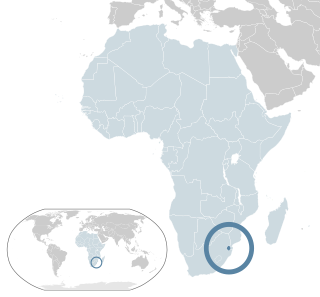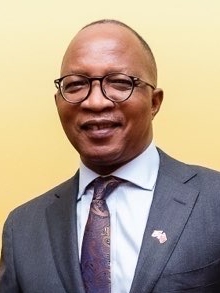Related Research Articles

Eswatini, officially the Kingdom of Eswatini and also known by its former official name Swaziland and formerly the Kingdom of Swaziland, is a landlocked country in Southern Africa. It is bordered by Mozambique to its northeast and South Africa to its north, west, south, and southeast. At no more than 200 km (120 mi) north to south and 130 km (81 mi) east to west, Eswatini is one of the smallest countries in Africa; despite this, its climate and topography are diverse, ranging from a cool and mountainous highveld to a hot and dry lowveld.
The Umbutfo Eswatini Defence Force (UEDF) is the military of the Southern African Kingdom of Eswatini (Swaziland). It is used primarily during domestic protests, with some border and customs duties; the force has never been involved in a foreign conflict. The army has struggled with high rates of HIV infection. Since measures were put in place the rate is dropping.

Eswatini is a member of the United Nations, the Commonwealth of Nations, the African Union, the Common Market for Eastern and Southern Africa, and the Southern African Development Community. Currently, the Kingdom of Eswatini maintains 11 embassies and High Commissions along with 15 consulates and other representations around the world, while there are five embassies and High Commissions in Eswatini as well as 14 consulates and other representations.

Artifacts indicating human activity dating back to the early Stone Age have been found in the Kingdom of Eswatini. The earliest known inhabitants of the region were Khoisan hunter-gatherers. Later, the population became predominantly Nguni during and after the great Bantu migrations. People speaking languages ancestral to the current Sotho and Nguni languages began settling no later than the 11th century. The country now derives its name from a later king named Mswati II. Mswati II was the greatest of the fighting kings of Eswatini, and he greatly extended the area of the country to twice its current size. The people of Eswatini largely belong to a number of clans that can be categorized as Emakhandzambili, Bemdzabu, and Emafikamuva, depending on when and how they settled in Eswatini.

Mbabane is a city in Eswatini, and is one of the two capitals, serving as the executive capital.

Mswati III is Ngwenyama (King) of Eswatini and head of the Swazi royal family. He heads Africa’s last absolute monarchy, as he has veto power over all branches of government and is constitutionally immune from prosecution.

Sobhuza II,, was Ngwenyama (King) of Swaziland for 82 years and 254 days, the longest verifiable reign of any monarch in recorded history.

Lobamba is a city in Eswatini, and is one of the two capitals, serving as the legislative, traditional, spiritual, seat of government of the Parliament of Eswatini, and Ludzidzini Royal Village, the residence of Queen Ntfombi, the Queen Mother.
Child labour in Eswatini is a controversial issue that affects a large portion of the country's population. Child labour is often seen as a human rights concern because it is "work that deprives children of their childhood, their potential and their dignity, and that is harmful to physical and mental development," as defined by the International Labour Organization (ILO). Additionally, child labour is harmful in that it restricts a child's ability to attend school or receive an education. The ILO recognizes that not all forms of children working are harmful, but this article will focus on the type of child labour that is generally accepted as harmful to the child involved.

iNgwenyama is the title of the male monarch of Eswatini. In English, the title is sometimes translated as King of Eswatini. The iNgwenyama reigns together with the Ndlovukazi, a spiritual leadership position held by the iNgwenyama's mother or another female royal of high status.

Lesbian, gay, bisexual, and transgender (LGBT) people in Eswatini have limited legal rights. According to Rock of Hope, a Swati LGBT advocacy group, "there is no legislation recognising LGBTIs or protecting the right to a non-heterosexual orientation and gender identity and as a result [LGBT people] cannot be open about their orientation or gender identity for fear of rejection and discrimination". Homosexuality is illegal in Eswatini, though this law is in practice unenforced. According to the 2021 Human Rights Practices Report from the US Department of State, "there has never been an arrest or prosecution for consensual same-sex conduct."

The following outline is provided as an overview of and topical guide to Eswatini:

Christianity is the predominant religion in Eswatini, with Protestantism being its largest denomination.
Events in the year 2021 in Eswatini
The following lists events that happened during 2021 in Southern Africa. The countries are those described in the United Nations geoscheme for Southern Africa.
A series of protests in Eswatini against the absolute monarchy and for democratisation began in late June 2021. Starting as a peaceful protest on 20 June, they escalated after 25 June into violence and looting over the weekend when the government took a hardline stance against the demonstrations and prohibited the delivery of petitions. Lower-level unrest and protests continued until summer 2023.

Cleopas Sipho Dlamini is a Liswati business executive who served as the prime minister of Eswatini from 2021 to 2023.

Eswatini nationality law is regulated by the Constitution of Eswatini, as amended; the Swaziland Citizenship Act, and its revisions; and various international agreements to which the country is a signatory. These laws determine who is, or is eligible to be, a national of Eswatini. The legal means to acquire nationality, formal legal membership in a nation, differ from the domestic relationship of rights and obligations between a national and the nation, known as citizenship. Nationality describes the relationship of an individual to the state under international law, whereas citizenship is the domestic relationship of an individual within the nation. Eswatini nationality is typically obtained under the principle of jus soli, i.e. by birth in Eswatini, or jus sanguinis, born to parents with Eswatini nationality. It can be granted to persons with an affiliation to the country, or to a permanent resident who has lived in the country for a given period of time through naturalisation or the traditional khonta system.
References
- ↑ List
- ↑ "Supplement To The Swaziland Government Gazette". The Swaziland Government Gazette. LIII (88): 6.
- ↑ "Eswatini Public Holidays 2021". PublicHolidays.africa. Retrieved January 26, 2021.
- ↑ "Incwala Festival | The Kingdom of Eswatini". The Kingdom of Eswatini. Retrieved January 26, 2021.
